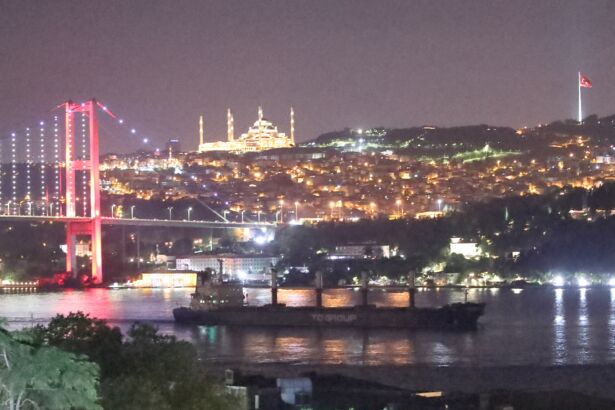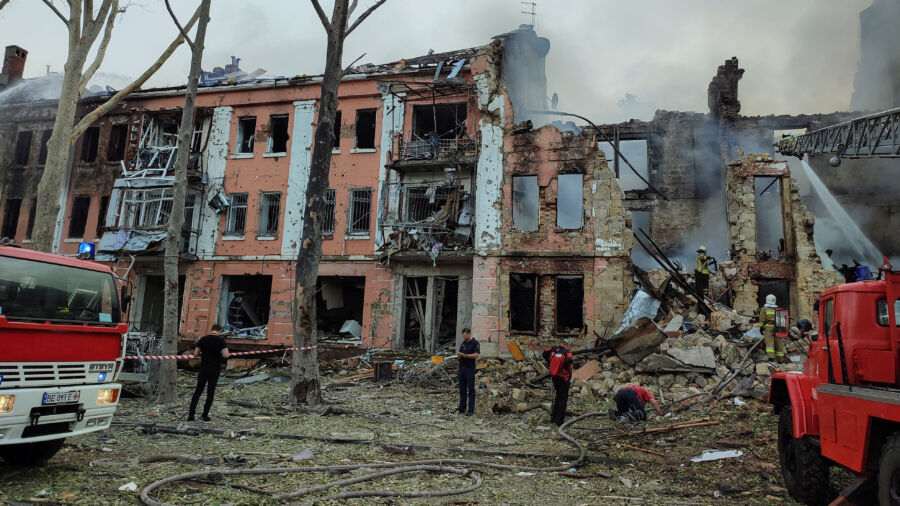MYKOLAIV/NEAR KUPIANSK, Ukraine—Russia jolted world grain markets with an escalation in the Black Sea, mounting a third straight night of air strikes on Ukrainian ports and issuing a threat against Ukraine-bound vessels to which Kyiv responded in kind.
At least 27 people were reported hurt in the air strikes on the ports, which set buildings ablaze and damaged China’s consulate in Odesa.
The United States said Russia’s warning to ships indicated Moscow might attack vessels at sea following Moscow’s withdrawal this week from a U.N.-brokered deal to let Ukraine export grain. The signals that Russia was willing to use force to reimpose its blockade of one of the world’s biggest food exporters set global prices soaring.
Moscow says it will not participate in the year-old grain deal without better terms for its own food and fertiliser sales.
Kyiv is hoping to resume exports without Russia’s participation. But no ships have sailed from its ports since Moscow pulled out of the deal on Monday, and insurers have had doubts about whether to underwrite policies for trade in a war zone.
Since quitting the deal, Moscow has rained missiles down nightly on Ukraine’s two biggest port cities, Odesa and Mykolaiv. Thursday’s strikes appeared to be the worst yet.
Odesa regional governor Oleh Kiper posted an image online of China’s consulate building with broken windows. It is located in Odesa’s city centre just across railway tracks from the port.
Moscow has described the port attacks as revenge for a Ukrainian strike on Russia’s bridge to Crimea on Monday. It said on Thursday its retaliatory strikes were continuing and it had hit all its targets in Odesa and Mykolaiv.
In its most explicit threat yet, Russia’s military announced it would deem all ships heading for Ukrainian waters from Thursday morning to be potentially carrying weapons, and their flag countries as parties to the war on the Ukrainian side. It said it was declaring parts of the Black Sea to be unsafe.
Kyiv responded on Thursday by announcing similar measures, saying it would consider vessels bound for Russia or Russian-controlled Ukrainian territory also to be carrying arms.

Cluster Munitions Reach Front Lines
Beijing made no immediate public mention of the incident at its consulate, which took place while Ukraine’s Economy Minister Taras Kachka was in China for the first high level Ukrainian visit since the war started.
China said it told Kachka it was willing to expand imports of Ukrainian goods. Kyiv has long sought to persuade Beijing to distance itself from Moscow.
The escalation in the Black Sea comes as Kyiv reports a new attempt by Russia to return to the offensive in the northeast of Ukraine, where it says Moscow has massed 100,000 troops and hundreds of tanks.
On the front line near Kupiansk, a railway hub Ukraine recaptured last month, Stanislav, an artillery unit commander, said his forces had received newly issued cluster munitions, and could start firing them soon: “Maybe today or tomorrow.”
The United States has started sending Ukraine cluster munitions this month, though many countries have banned them as a potential danger to civilians.
Since last month, Ukrainian forces have been on the march in the east and the south, recapturing small amounts of territory in their first big counteroffensive since last year. But the going has been slow.
Wheat Prices Jump
The Black Sea escalation pushed U.S. wheat futures up an additional 1.5 percent in the early hours of Thursday, after they jumped 8.5 percent on Wednesday, their fastest single-day rise since the initial days of the Ukraine conflict in February last year.
Both Ukraine and Russia are among the world’s biggest exporters of grain and other foodstuffs. The United Nations says withdrawing tens of millions of tonnes of Ukrainian grain from the market would cause worldwide shortages.
Russia, which shut Ukraine’s ports in the early months of the war, let them reopen a year ago under the grain deal, with Turkey and the United Nations supervising inspections of vessels with Russian participation.
A parallel deal offered guarantees for Russia’s own food and fertiliser exports. Moscow says this has not been fully implemented.

